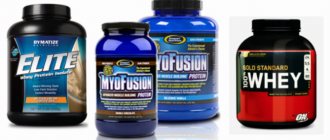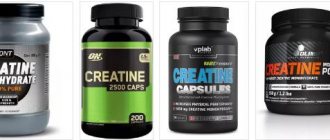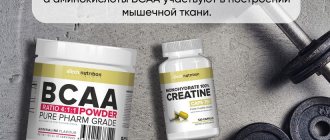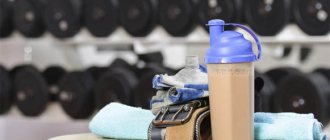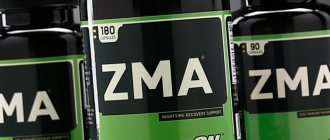Home » About sports nutrition » Sports nutrition for running
About sports nutrition
Sports nutrition manufacturers produce products for people who run. However, there is such a variety of nutritional supplements for runners that not everyone knows what to choose. Let's try to understand this issue.
What it is?
Some athletes mistakenly believe that nutritional supplements are doping, which greatly increases a person’s strength and endurance. Actually this is not true. Sports nutrition is designed to help the body recover faster after training and replenish the balance of vitamins and nutrients.
The diet when jogging should contain the necessary elements in conditions of increased stress on the body. They can be consumed both with food and with sports nutrition, which will add endurance in running and improve training performance.
Scientists are constantly inventing more and more new sports complexes, achieving more effective effects on the body. Therefore, types of nutrition that were considered effective just yesterday are no longer recognized by athletes today.
It often happens that different studies give completely opposite results. Therefore, you should not trust too much the opinion of scientists, who can also be wrong. It is best to pay attention to the achievements of professional athletes. This is the most clear evidence of the benefits of this or that type of nutrition.
It happens that the benefits of an element have not been proven by research, but it gives excellent results to athletes who use it. Of course, self-hypnosis (placebo effect) can work here. However, psychologists say that self-hypnosis also plays a significant role in achieving what you want. Thus, you should not delve too deeply into scientific data, looking for evidence of the effectiveness of certain types of nutrition. It is better to focus on the practical experience of famous athletes who have already achieved great results in sports.
Coffee
Most athletes prefer to drink coffee in the morning before starting a workout because of its caffeine content. In addition to the fact that a cup of brewed coffee perfectly awakens the body, it also improves endurance due to the fact that it reduces the severity of the brain’s perception of physical activity.
Matt Fitzgerald, in his book Diet of Champions, cites a 2014 study that found that 73% of 23,000 urine samples taken from Olympic athletes over 5 years had traces of caffeine. Its highest level is in tests of triathletes, rowers and cyclists.
Since the amount of caffeine in coffee varies, many athletes prefer to use caffeine tablets, chewing gum, and energy drinks. The unique combination of this substance with antioxidants makes this drink a good stimulator of sports performance. Scientific research shows that it is completely safe to drink up to four cups of coffee a day.
Do runners need sports nutrition?
If everything is clear with the rationale for the use of supplements by bodybuilders, since in this sport you need to eat a large amount of calories and in particular proteins, then with running everything is not so clear. Still, it is important for a runner to maintain body weight and avoid weight gain, and supplements most often have the opposite effect.
Still, it makes sense for runners to take specialized nutrition. For example, while preparing for a race or when losing weight, when you need to consume a minimum amount of fat. Taking protein in its pure form will help you avoid eating a lot of fat through your regular meals. It happens that after a workout “you can’t get a bite into your throat,” but you need to eat because your body is exhausted. Agree, it is much easier to persuade yourself to drink a protein shake than to eat a portion of buckwheat. Sports supplements are also available in the form of vitamins and minerals, which are important for a runner’s body. As a result, sports supplements will be useful for runners who are preparing for serious competitions or for those who want to reduce body weight and improve their figure. Thus, the myth that runners should not take supplements remains just that: a myth.
Grape juice
Grapes are a real carbohydrate bomb, consisting of 86% fructose and glucose. Therefore, it is obvious that its fruits supply the body not only with useful substances, but also with energy.
Brazilian scientists announced the benefits of grape juice in 2015. They published a study that found the drink had the same ergogenic (performance-enhancing) properties as sports supplements. The experiment involved 28 runners - men and women, who were divided into groups. Members of the first group drank an average of 700 ml of juice daily for 28 days, while participants in the other groups drank isotonic drinks of similar calorie content. They all trained at normal intensity, running 7 km a day. The results showed that drinking grape juice increases endurance and reduces inflammation in the body.
So what is a balanced diet for runners?
Carbohydrates (60-65%)
Carbohydrates provide fuel for the runner. Simple carbohydrates (including fruits and sweets) are the main form of sugar; they provide a quick and short burst of energy.
On the other hand, complex carbohydrates such as grains, pasta, bread, rice, potatoes and vegetables are a sustainable source of energy that works on a more consistent and long-term basis. A runner's diet should contain large amounts of these complex carbohydrates, eaten small and often, in order to maintain sufficient levels of muscle glycogen to prevent the body from running into overdrive.
Fats (20-25%)
Your body doesn't need fat, just the right type and quantity of fat. Saturated fat, found in red meat and dairy products, is needed by the body in small quantities and should make up only 10% of your total calorie intake. Monounsaturated fats include olive oil and most other natural oils; they are considered healthy fats. Such fats should make up the majority of your daily fat intake.
Protein (10-20%)
Protein helps build muscles and tendons, repairs needed muscles and regulates hormone levels. Meat, eggs, beans and nuts are traditional foods that contain significant amounts of protein.
Water
Water regulates body temperature through sweating, so runners must constantly hydrate regardless of the outside temperature. The best option is to spread fluids throughout the day rather than drinking large amounts in a short period of time, and remember to replenish any extra fluid lost during your run. If a runner is thirsty, this is the body's way of signaling that he is already dehydrated. It's important to take a measured approach, especially on race days, because while runners should drink as much water as possible, they shouldn't drink heavily throughout the day.
General principles of nutrition when running
- For quick muscle recovery, consume protein at the rate of about.7 grams per 1 kg of your weight.
- To suppress catabolic processes, you should take 5 grams of BCAA every morning.
- To reduce fatigue and increase endurance, take beta-alanine (dosage - 2 grams per day)
- To improve metabolic processes, increase endurance and burn excess fat, use l-carnitine (dosage – 2 grams per day)
- After each breakfast, take a vitamin-mineral complex and Omega-3 fatty acids
- Try to eat a balanced diet: 50% of your daily calories should come from carbohydrates, 30% from proteins and 20% from fats.
Meal 30-40 minutes before running
- Slow carbs or gainer (90 minutes before running)
- BCAA – 5 grams
- Isotonic drink
- Energy drink (the composition may resemble an isotonic drink, but also contains some stimulants)
Eating after finishing a run
- Drink several sips of water frequently over several hours at short intervals.
- Within 20-30 minutes after finishing your run, take a carbohydrate meal (for example, corn porridge) or a gainer; this will quickly replenish glycogen stores in the liver and muscles.
- BCAA – 5 grams.
- Beta-alanine – 2 grams.
- An hour after finishing your run, take a serving of whey protein.
Isotonics
The task of isotonics is primarily to maintain water-salt balance in the body. In addition, isotonic drinks contain a small amount of carbohydrates, which makes them possible to use while running and as energy drinks. Although, in fairness, it is worth noting that the energy value of isotonic drinks is much less than that of energy gels. Therefore, to fully replenish lost energy, isotonic drinks alone may not be enough.
Isotonic drinks are best consumed before and immediately after training. Ideally, you should drink them during cross-country races instead of regular water, but this is not always convenient.
The exact volumes are written on the packages, so there is no point in giving them. The same applies to all other sports nutrition. The exact dosage and time of administration are written everywhere. Therefore, difficulties should not arise in this regard.
Energy gels
If your workout lasts more than an hour and a half, then your body requires additional carbohydrate fuel, since the stored carbohydrates will be completely used up within an hour and a half. Energy gels cope best with this task. They contain carbohydrates with a different glycemic index, that is, some of the carbohydrates will be absorbed very quickly and provide energy instantly, the other part will be absorbed gradually, providing energy for a long time. Also, in addition to nutrition, gels often contain potassium and sodium, which allows the gels to partially perform the function of an isotonic agent.
Most gels need to be written down, but there are gels that do not need to be washed down. It depends on the species. In addition, there are gels whose task is to close the so-called protein-carbohydrate window, which “opens” immediately after a hard workout and lasts about an hour. During this period, it is very important to replenish lost reserves of proteins and carbohydrates. But regular food is not suitable for this. Because he simply won’t have time to assimilate it in an hour. Therefore, special gels containing carbohydrates and proteins are the best option for this task. A good option for such a gel is the RECOVERY PLUS ELITE gel from myprotein. It contains 15 grams of protein and 20 grams of carbohydrates, which is exactly what is needed to close this very protein-carbohydrate window. If you don’t have time to do this, the body’s recovery will take much longer. And the effectiveness of the training itself will be reduced. Instead of gels, you can also use gainers as a product that will allow you to “close” this very “carbohydrate window”. Their composition precisely contains the carbohydrates and proteins needed for this.
Vitamins
Whether you are an athlete or not, you need to have the right amount of vitamins if you want your body to function fully and correctly. Unfortunately, it is possible to determine exactly which vitamins you are lacking only through laboratory testing. Therefore, the easiest way is not to try to close the gap, but to use multivitamin complexes. The amount of vitamins in them is balanced and makes it possible to fill all the gaps. There are a lot of vitamins on the market. Different manufacturers, different prices. It is better to buy those whose manufacturer you already know and trust.
L-Carnitine
L-carnitine (L-carnitine) is a special substance that increases the rate of metabolism of fats in the body, in other words, it functions as a fat burner.
Excellent as sports nutrition for long-distance running. When preparing for a marathon or any other long runs, L-Carnitine is practically irreplaceable. It is also recommended to take it during preparation, because during this period you increase volume. This sports nutrition is good for losing weight, strengthening the immune system and saturating the body with energy. Essentially, L-Carnitine transforms your subcutaneous fat into clean energy.
The main advantage is that this energy drink doesn’t just give you strength to run. It converts fat into energy, and not, say, the carbohydrates you had for breakfast. But you shouldn’t take such sports nutrition as pure energy drinks: you will definitely feel the lift, but it won’t be as pronounced.
It is best to include such nutrition in your daily routine in the morning. It is advisable to take it 40 minutes before training or before breakfast. The effect after taking carnitine lasts about 6 hours. Therefore, taking carnitine in the afternoon is fraught with loss of sleep or, at a minimum, disruption of the correct regime. In some cases, it can even provoke frequent attacks of insomnia. Another important point is that after continuous use for a month or two, you should take a break. This is not a recommendation, but a rule! The fact is that your body gradually gets used to the fact that the dose of carnitine appears by itself, and stops producing its own. Buy or order L-Carnitine in specialized sports nutrition stores. And you shouldn’t shop in pharmacies: carnitine there is often not intended for athletes. There are nutritional options in powder, capsules or dissolvable tablets. The cheapest option is powder, but it is not the most convenient. There should be no problems with dosage, since everything is usually prescribed on the package. Or you can contact the specialists directly.
Essential amino acids
Amino acids are extremely important elements for the functioning of our body. Each of them performs a huge number of important functions, ranging from strengthening the immune system to controlling the production of growth hormone. And if the main part of the amino acids can be synthesized by the body, then there are 8 so-called essential amino acids that the body cannot synthesize and needs to receive them only through diet. That is why, first of all, it is these 8 that need to be consumed additionally, since regular nutrition cannot cover their loss. Of course, this is not a complete list of sports nutrition that makes sense for runners. But in general, even what is described in the article will be of great benefit in restoring and improving your performance.
Creatine
Creatine is a component of protein called an amino acid and is found in meat products. Creatine is a partially replaceable amino acid, which means that under certain conditions it can be synthesized independently. On average, the human body contains 140 grams of this substance. Exceeding the norm leads to an increase in physical qualities such as strength and general endurance. These physical qualities are important for runners, especially endurance. Studies show that increasing the level of creatine in muscles allows you to perform physical work 9% longer than usual.
Creatine - taken before competitions and during the race, it leads to an increase in physical qualities and improves the body's endurance.
The experiment was conducted on a group of athletes who were involved in rowing. A condition was set according to which the participants in the experiment had to maintain the same pace for as long as possible. One swim was carried out before the start of treatment, and the second after 3 weeks. The result differed by 9% towards the second swim.
Creatine is found in small quantities in meat, and to increase physical performance you need to additionally consume 10-15 grams of pure substance per day. This equals 2 kilograms of beef. It is much easier to mix 3 tablespoons of powder with pure creatine in juice than to buy it and then eat that much meat.
How to use?
The supplement is taken every day, 2 times 5 grams. That is, the daily norm of creatine is 10 grams. If your weight is more than 90 kilograms, then you can increase the dosage to 15 grams. Should be taken with sweet liquid. Grape juice or water with honey or sugar will do. The time of administration does not matter much, but usually in the morning and evening or after training.
Protein
Protein will be useful for those who want to lose weight, as it can help you avoid consuming some amount of fat. In addition, protein is the “brick” from which muscles are built. Protein contains 20 amino acids that have different purposes. For example, threonine and ornithine take part in the synthesis and breakdown of fats. Valine, leucine and isoleucine take an active part in the formation of muscle tissue.
Protein is recommended for sprinters rather than marathon runners. It perfectly saturates the body with protein, which is simply necessary for muscles during the recovery process.
How to use?
The protein is taken in the form of a milkshake or mixed in cold water (the protein coagulates in hot water) up to 5-6 times a day. The daily dosage of protein is calculated based on body weight, where there are 2 grams of protein per 1 kilogram of weight. If an athlete weighs 80 kilograms, then he needs 160 grams of protein per day. In this case, from the daily norm you need to subtract the approximate amount of protein that is eaten through a regular meal, and consume the rest with the help of a supplement. You can drink a cocktail before and after, but not during training! If you drink a portion during exercise, some blood will leave the muscles to the digestive organs, which will negatively affect the productivity of the workout.
Fat burners
There are 3 types of fat burners: thermogenics, lipotropics and blockers. Thermogenics are best suited for weight loss through running, so we’ll tell you more about them. You can read about the rest on the pages of our other project.
The fat burner works very effectively when running. Because it gives you energy for training due to stimulants + accelerates the processes of consuming fat reserves as energy.
Thermogenics are a mixture of guarana, synephrine and caffeine. Their effect is to increase body temperature, which significantly increases sweating during exercise. The result comes quite quickly, but is expressed in the loss of a large amount of water. In this case, additional fat burning occurs, but more slowly.
How to use?
Take thermogenics 2 times a day: in the morning and before training. It is not recommended to use the supplement before bed, as it has a tonic effect and can cause insomnia. Thermogenics should be used with extreme caution. This is especially true for those people who suffer from diseases associated with the cardiovascular system. Consultation with a specialist is advisable.
BCAA
BCAA - taken before and after running. Recommended for professional athletes to replenish essential amino acids.
You can immediately clarify that this sports nutrition is not for running, but after running. But we will also add that such nutrition is not particularly useful for beginners and inactive runners. If you go for a run at most 2-3 times a week and enjoy the fresh air with a light jog, then buying BCAAs will become one of the most pointless. But if you exercise constantly, intensively, and feel that your body simply does not have time to rest and recuperate, then this sports nutrition is prescribed for you. It’s simple to determine: every morning your muscles ache, your mood is depressed, and you can’t get enough sleep - we urgently buy BCAAs.
BCAAs are indispensable when preparing for a marathon, and for sprinters it’s everything. During intense training and racing, your fibers will tear as easily as chintz. And such sports nutrition for runners helps the fibers heal before the next workout. Many people recommend taking BCAAs before, during and after running, but this regimen will not help.
Guarana
a natural energy drink from an evergreen plant, an analogue of caffeine, but differs from it in a longer action of 4-5 hours and does not cause sudden jumps in energy, the effect is even in the background. Guarana increases productivity, concentration, increases the breakdown of subcutaneous fat, and reduces fatigue.
Guarana has a positive effect on brain function, improving concentration, and also leads to a surge of strength and a decrease in body fatigue.
Recommendation for use: Take 30-40 minutes before the start of training or a competitive race. When choosing, you should pay attention to the release form; it is better to choose guarana in liquid form because it usually has a higher dosage and a faster effect. The optimal dosage is from 400 mg to 1000 mg per serving.
Beta Alanine
This amino acid is part of proteins. It helps to increase the anaerobic endurance threshold, one might say it delays the onset of fatigue. Able to reduce muscle pain after training, accelerates healing after injuries. Recommendation for use: Take 2 to 4 g before training. In powder form 30 minutes before training, in tablets or capsules 45 minutes - an hour before training. The intake can be divided into 2g before and 2g after training to improve recovery. It has a side effect when taken, tingling on the skin, which goes away over time; this is a completely safe reaction.
Arginine form AKGG
This is an easily digestible release form of the amino acid arginine. It is an excellent buffer for the flow of blood, oxygen and nutrients to muscle tissue. As a result, the muscles receive more building material, recover faster and their fatigue decreases, thereby increasing their resistance to stress.
Arginine is involved in all metabolic processes. If it is deficient, it is difficult for the body to resist various infections, viral diseases and deal with stress.
Recommendation for use: Take 5g daily. On training days, 20 minutes before training or a competitive race. On non-training days in the morning 20 minutes before meals.
Caffeine
Caffeine has long been used as a supplement by endurance athletes. Not only does it provide the quick boost needed for early morning workouts, but it also helps delay the onset of fatigue, making it possible to run longer distances. There are numerous studies supporting the benefits of caffeine consumption in endurance sports, including cycling, skiing and 8K running. As a bonus, caffeine may increase fat oxidation, which can help with fat loss and weight management. Since caffeine reaches its maximum concentration in the bloodstream in about an hour, we recommend taking it 60 minutes before your race to help you get through a 5K, 10K, or even a marathon! And although caffeine is a diuretic (diuretic), a recent paper from researchers at the University of Connecticut states that caffeine use does not cause fluid and electrolyte imbalances or a decrease in tolerance to increased body temperature during exercise. Recommended dosage is 2.9-6 mg per 1 kg of body weight 60 minutes before training.
Sodium phosphate
Typically used to preserve meats and other foods, sodium phosphate can now add athletic performance-boosting properties to its list of benefits. Loading with sodium phosphate has been proven to increase breathing efficiency and slow down the time to exhaustion by increasing the ability of red blood cells to deliver oxygen to working muscles. In addition to this, several studies have found improvements in endurance performance by increasing maximal oxygen uptake. Recommended dosage: 3-5 g per day before training or competition.
While running
Energy Elite™ Gel
There is no need to eat during the run, as long as you don't pass the 90-minute mark. This is when you need to replenish your carbohydrate reserves to support your body. Obviously, you don't want to take food with you on your run, so an energy gel that fits easily in your pocket is the perfect solution. Our Energy Elite™ Gel Packs contain 25g of carbohydrates to increase glycogen stores, plus a blend of B vitamins to reduce fatigue and fatigue. This is one of the most supportive supplements for runners who want to conquer the distance.
Suitable for long distance running.
What supplements are best not to use?
I would like to point out a supplement that will not benefit a runner. Its use will either stop progress or worsen the current result. We are talking about gainers, which are popular among bodybuilders, as they allow you to quickly gain total body weight to accelerate muscle growth. For a runner, this supplement will be an “extra burden” and its use is not justified. The gainer contains a large amount of proteins and carbohydrates. This mixture of substances accelerates the growth of body weight, which for a runner equals a loss of results, and when losing weight it is completely a failure.
Including a gainer in your diet is advisable only with a balanced diet and high-intensity training, when a large amount of carbohydrates and proteins are consumed. In other cases, the benefit of a gainer for runners is questionable.
This is all about the use of sports nutrition by people who regularly run. Use the information received correctly, and then you will not have to fear any harmful effects.
scfoton.ru/sportivnoe-pitanie-dlya-bega www.iron-health.ru/pitanie-atleta/kakie-pishhevye-dobavki-prinimat-zanimayas-begom.html beguza.ru/sportivnoe-pitanie-dlya-bega/ www. asics.ru/running/knowledge/howtoeat/ blog.price.ua/kak-vyibrat/sportivnoe-pitanie-dlya-bega-atletam-na-zametku/ i-pump.ru/sportivnoe-pitanie/534-sportivnie-dobavki- dlya-vynoslivostu
Mineral water
It is beneficial for the body if it is natural water from a deep well, the number of which is indicated on the bottle.
Mineral water perfectly quenches thirst and helps restore the body after a hard aerobic workout in the heat. Evidence for this claim was provided by a group of Lithuanian scientists in a 2014 report.
Nine healthy women were asked to drink mineral water obtained from a depth of 689 m or purified tap water after exercise. Each participant did a long aerobic run every day at a temperature of 30°C for seven days. The scientists then switched participants and continued the week-long session again.
As a result, body weight decreased by almost 3% after the dehydration workout. At the same time, the level of VO2 max after 4 hours of recovery was 9% higher in those who took mineral water, and their muscle strength in the legs was restored faster after the race.
Read more: How much water should runners drink? How to choose a bottle or flask for running
Alternative energy sources
Gels cannot be the only source of nutrition for athletes. They are convenient, but you shouldn’t forget about other options. The best help will be nuts, bananas, oranges, exotic foods, potatoes. It is not recommended to eat unhealthy foods: chips, candies, cookies, cola.
Alternative options are considered to be:
- Fruit purees. They are distinguished by their naturalness and ease of digestion. Its action is faster than maltodextin and faster than honey. They are easily digestible and have a pleasant taste.
- Nut paste. There are a lot of calories present. Tasty, but digested slowly.
- Baby food. The main difference is the absence of additives. It surpasses its analogues in price.
Everyone's selection criteria are different. There is only one main rule: you cannot experiment in competitions; it is better to test during training.
What other alternatives to energy gels are there? We offer common options:
- dried apricots;
- raisin;
- marmalade;
- almond;
- a variety of “solid” foods.
Food should be high in calories, easy to digest, and not lead to heaviness in the stomach. Personal intolerance to individual components is of no small importance.
Where to buy energy gels
The athlete needs to decide which company is best to purchase products and visit a specialized retail outlet. They will offer a choice of different types, depending on the taste preferences and material well-being of the buyer. The average price of popular brand models is steep, however, their characteristics are superior to similar products.
You can order the gel online in an online store, after first studying the rating of quality products, functionality, and reviewing the options offered. The main thing is to decide what they are needed for. This type of acquisition is fraught with misunderstandings. Poor quality fakes or the wrong set may arrive. We'll have to cancel the order.
How to Minimize Exercise with Nutrition and Supplements for Running
Nutrition provides the athlete’s body with building material, thanks to which new tissue is created and damage is repaired. The speed with which the body recovers after exercise depends on nutrition. The faster the recovery processes go, the stronger and more resilient the body becomes. Meals for runners should be balanced and nutritious. An athlete must include a sufficient amount of proteins, fats and carbohydrates in his diet, as well as adhere to the rules of nutrition before and after training.
